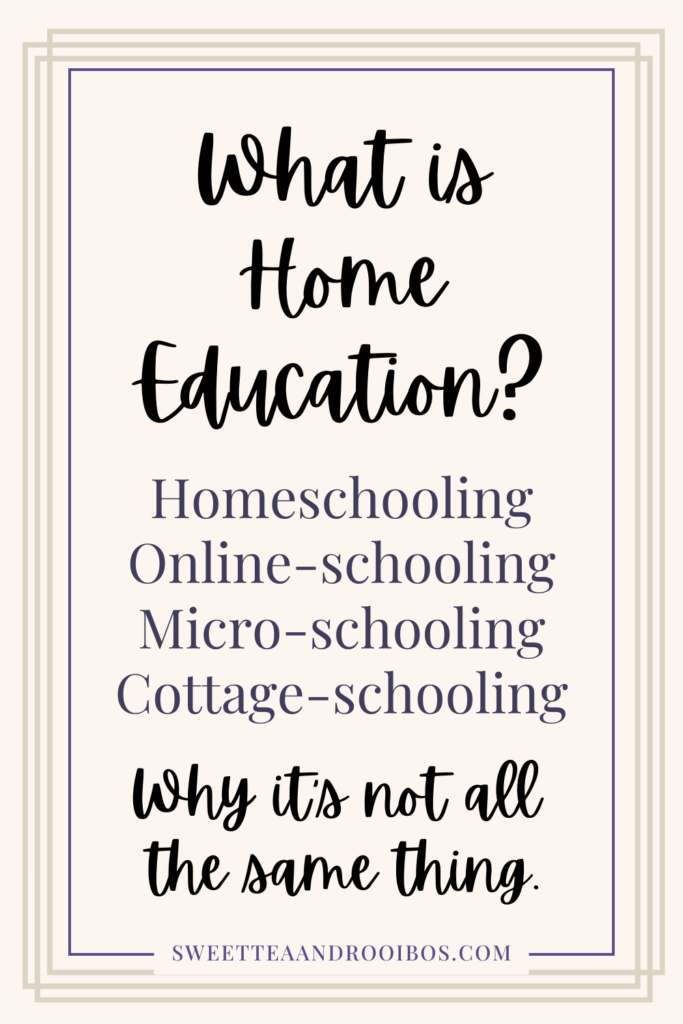
What is Homeschooling?
Since COVID, there’s been a lot of “clumping” alternative-education under the home-schooling umbrella, as though it’s all one and the same. Alternative education is a needed solution, that serves needs traditional schooling can’t meet, and in most cases, does so brilliantly. While homeschooling IS considered a form of alternative education, not all alternative education is homeschooling.
So, here is what homeschooling is NOT.
Homeschooling is NOT online-schooling. Online Schooling is school work provided by a service provider, which the student completes on the computer, either at a center, or at home. Even when the online schooling curriculum is being executed at home, usually the instruction, grading, syllabus, and content is all orchestrated by the provider. This allows parents to have a very hands-off approach and can be a useful alternative where parents are not able to be directly involved. (If this is the best fit for you, that is GREAT! It means that you are Online-schoolers.)
Homeschooling is NOT a learning center or micro-school. Learning Centers are micro-schools that may facilitate online curriculum, traditional text book learning, or a curated curriculum specific for that student’s needs and learning style. Learning Centers are able to offer a lot more flexibility to students, curated towards their needs, and is usually facilitated by one or more certified teacher(s) on campus. Instruction, grading, syllabus, and content is orchestrated by the faculty of the Learning Center. Parents will have various levels of input into these choices when filling out their applications. (If this is the best fit for you, that is also GREAT! It means that you are a Micro-schooler.)
Homeschooling is NOT a cottage-school. Cottage schools are places of learning, usually facilitated by one teacher, who teaches a small group of children in their home. These schools come the closest to trying to replicate what home-education looks like, when home-education is not possible. These are especially helpful for children who feel more comfortable in a home environment, have sensory needs, or need specialized instruction. Specialized instruction can include anything from programs for the gifted, special needs programs, to unique approaches like “forest-schools” etc. Again, the curriculum, instruction, grading, syllabus and content are usually chosen and executed by the facilitator. (If you find a Cottage-school that meets your child’s needs, that is wonderful! It means that you are Cottage-schoolers. Excellent!)
So, what IS Homeschooling? Homeschooling is when the parent retains full responsibility for facilitating their child’s educational needs, curriculum, instruction, grading, syllabus, and content, themselves. Homeschooling can still mean that the parent decides to make use of a tutor for a subject or sign their child up for an online course. However, the parent retains the position of “primary educator.”
Why do homeschoolers get so upset when one of the first three options call themselves homeschoolers? Depending on your area, not all of the above are legally recognized. Where this is the case, I am all for working with our elected officials to change those laws. Alternative education meets SO many needs of families and children that mainstream education is failing. We NEED all of the above options. We need them running, thriving, and legal.
Homeschooling, as defined above, is legal in most places. (Check your local area for laws and regulations pertaining to you.) And so, the confusion usually comes from well-meaning operators who just want to serve families. By calling themselves “homeschoolers” they fall under legal terminology, although they don’t meet the defined criteria. The families then repeat the terminology they have heard.
So why do we care? Well, this causes problems for actual (by legal definition) homeschooling families, as it confuses government officials who don’t always understand the legal differences themselves and harass law-abiding citizens. Therefore, it becomes important to educate the populace, so we use correct terminology, and where necessary, work to get the law to reflect what is in the best interest of our children.
So, which is the right option for you?
There are a lot of benefits to the first three options. A parent can keep working and earning, while choosing a curated educational plan the is an ideal fit for their child. They can delegate the admin of grading and reporting to the program that they have chosen and leave the day-to-day decisions of content and instruction up to the facilitator. (Just check the laws in your area.) So, assuming all options are available and legal, why would a parent choose Homeschooling, as defined above?
8 reasons to choose homeschooling:
- Religious Beliefs: Many parents desire to incorporate specific religious teachings into their child’s education. For Christian parents, homeschooling allows the integration of Christian teachings, values, and Bible study into the daily curriculum, which might not be possible in other schools.
- Closeness of Family Bonds: Homeschooling fosters stronger family relationships and a closer bond between parents and children through shared learning experiences. This strengthens family relationships and ensures that parents play a central role in their children’s spiritual and academic development.
- Customized Learning: The ability to tailor educational content to suit the child’s learning style, pace, and interests. For Christian Parents: The choice of curricula addresses concerns about the content taught in public schools, such as evolution, sex education, and other topics they may find objectionable. In addition to the ability to exclude these things, it also allows parents the freedom to make use of excellent educational materials that incorporate a Christian worldview into all areas of study.
- Flexibility: The ability to create a flexible schedule that accommodates family needs and allows for travel or unique learning experiences.
- Individual Attention: Homeschooling provides more personalized attention and one-on-one teaching that may be lacking in traditional classrooms. EVERY child has unique needs. Whether a student is gifted and being held back as they wait for other children to catch up, or a child has learning disabilities, special talents, medical conditions, reading delays, or motor skill development issues, homeschooling allows for a student to get what they need quickly, due to the individual attention they receive.
- Safety and Well-being: Concerns about safety, bullying, or negative social influences in traditional school settings.
- Academic Performance: Homeschooling can address concerns about academic standards, pace, or quality of education in local schools. When done diligently and to a high standard, a homeschool environment can provide a higher quality of education tailored to their child’s individual needs and abilities.
- Negative School Environment: Dealing with dissatisfaction with the school environment, teaching methods, or curriculum offered by local schools. Protecting children from secular influences, peer pressure, and teachings that may conflict with their religious beliefs. Choosing peer groups and social interactions that reinforce their faith and values, rather than exposing children to potentially negative influences in a public school setting.
What choosing to Homeschool will mean for you:
- Loss of income: One parent will likely need to give up their income to perform the tasks necessary to homeschool well. While home education can be done on a budget, lifestyle changes may be necessary to facilitate this choice. It’s a full-time lifestyle.
- Responsibility: The teaching parent takes on the responsibility of their child/ren’s education. This is Big. Huge. Terrifying. (& Rewarding.) However, it’s a little less scary when you remember that, as their loving parent, there is NO ONE who knows what is best for YOUR child more than you. You will be choosing the curriculum you use, teaching that knowledge to your children, assessing their progress, and administrating the paper work your area requires.
- Loss of “free” time: I remember envying my working friends’ commute in traffic. Traffic is awful. And I have no doubt they’d roll their eyes to read this. But in the early years, all I could see was that they had finished office hours. They were on their way to pick up the kids, start dinner and laundry. It’s not easy to juggle all of that! And yet, I found myself envying the ability to drive an empty car in silence. Or listen to the radio station of my choice. It’s a silly example, but there is a LOT of together time when you homeschool. You will need to learn how to find balance and make space for yourself to thrive.
- Strong family bonds: It has been a beautiful thing to see how close my children are to each other, and to their Pappa and me. It’s about more than just the love we feel, it’s about the shared memories and discoveries made, the books we’ve read, the people we’ve met, and the places we’ve visited through those books… together. It’s the nature walks and Eco-rangers club outings, field-trips, and baking days… it’s just all of it. All that time spent together equals so much quantity time, that there are more opportunities for the quality time to hatch.
- Time. 15,210 Hours: Choosing to homeschool will buy you 15,210 extra hours with your children before they leave your house. For Christian parents, the Bible emphasizes the importance of consistently teaching and guiding our children in the Faith and biblical values throughout daily life. Deuteronomy 6:6-7 tells us to take God’s commandments to heart, and to impress them upon our children. To talk about them when we sit at home and when we walk along the road, when we lie down and when we get up. That takes time. Choosing to homeschool gives us more time with them.
- Emotionally healthy children: Homeschooling doesn’t mean that your child won’t still go through difficulties, hormones, teen angst, etc. What it does mean is that they will go through it in a safe environment, surrounded by people who love them and have their best interest at heart. You are your child’s greatest advocate. They don’t need to work through these things alone.
- Academically confident: With homeschooling, a student is working to do THEIR best. They can only compare their latest best effort to their last best effort. They are never behind or ahead, they are simply progressing according to mastery, and mastery is determined by their comprehension of the materials. When they have a question, they have a parent ready to offer help, or to find the information the student needs. We don’t have to know it all, we just need to be willing to work alongside our children.
- Highs and Lows: With every decision, there are highs and lows, and the same is true for homeschooling. You can have seasons of highs, seasons of lows, and you can experience it all in one day. But if you will connect yourself with a like-minded tribe of homeschoolers, you will have support, advice, and equipping to guide you along the way.
How to decide If Homeschooling is right for YOU?
I never tell families they should homeschool. There are so many factors to consider, and I don’t know your situation, or your children. But what I DO know is this. YOU know your situation; YOU know your children better than anyone. YOU are the best person (and your spouse) to determine if this is the right decision for your family. What I can promise you is that IF you decide to take this road, you do NOT need to walk it alone. There are so many of us who’ve already walked the road, who are willing to take your hand. It’s a road I’m happy to walk along with anyone who asks, because I’ve experienced the journey, and glimpsed the destination, and my friends, it’s priceless.
To my children: You two are the best thing that’s ever happened to your Pappa and me. I am so grateful we got to spend these years together, and no sacrifice we have ever made, could compare to the gift of this life spent with the both of you.
